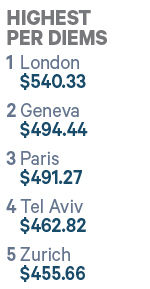
Buoyed by solid demand and strong macroeconomic conditions, airlines and hotel suppliers in Europe generally increased prices in 2018, but in the final quarter of the calendar year, some softness began that has continued into 2019. Driven in part by broader economic concerns—including the trade dispute between the U.S. and China, the yellow vests protests in France and of course the U.K.'s stumbling path to Brexit—the concerns to date have presented not as actual declines but as slower growth of airfares and hotel rates. "It's not a slowdown, regression or a panic; it's just that growth is slower than we've seen in the past," said Elyes Mrad, American Express Global Business Travel managing director of international. "This has an impact on some of the pricing we are seeing today."
London was the most expensive EMEA city for daily business costs in the fourth quarter of 2018, at more than $540. The city had the highest average daily hotel expenses outside the U.S., spurred by higher luxury and economy tier pricing than its peers, as well as an average airport taxi fare of more than $100.
Forecasting business travel demand and pricing for 2019 in London is challenging due to Brexit; as of this writing in mid-March, there was no clarity as to when, how or if the U.K.'s departure from the European Union was to take place. Whatever the outcome, particularly if the U.K. leaves without agreeing to terms with the EU, there could be consequences for travel demand and pricing. "Seeing London as a place to do business and as a place for meetings would lose attractiveness," Mrad said of the possibility of a no-deal Brexit. "It would have an impact, not necessarily in the first few months but in the next few years."
London, Tel Aviv and Geneva posted the highest fourth-quarter 2018 average daily hotel rates among the non-U.S. cities on BTN's Corporate Travel Index, and Paris' combined breakfast, lunch and dinner prices were the highest among all 200 U.S. and non-U.S. cities on the CTI, at nearly $164, just ahead of Geneva.
The Middle East & Africa
According to the CTI, fourth-quarter 2018 business travel per diems in Tel Aviv averaged nearly $463, well ahead of the $390 of Kuwait City, the second-most expensive city in the Middle East. BCD Travel's 2019 forecast suggests most hotel rates in the Middle East will be flat year over year amid continued expansion of supply. BCD noted, though, that an influx of tourism likely will spur increases of as much as 3 percent in Israel.
The Kenyan capital of Nairobi averaged nearly $276 in fourth-quarter-2018 business travel per diems, edging out Lagos, Nigeria's $271. Nairobi's daily hotel and meal costs also topped the African cities, again just ahead of Lagos.
A lack of secure hotel accommodations throughout many areas of Africa may push corporates to use higher-tier hotels. BCD Travel predicts this will push 2019 rates generally higher in most African countries except Ethiopia, where a spate of hotel openings could push rates down as much as 3 percent.
Risk
Luxembourg City and Vienna are the least dangerous of all 200 cities on the CTI, according to GeoSure. Travelers' chances of physical injury are lower in Luxembourg City than anywhere else in EMEA, and the risk of property theft is lowest there and in Glasgow. GeoSure considers Vienna's water and air quality and access to reliable medical care the best of all 200 cities. Stavanger, Norway, is the least likely locale in EMEA for violence or undesirable behavior against women. Discrimination against or harm of LGBTQ travelers is lowest in Luxembourg City. On the flip side, the potential for LGBTQ discrimination is higher in Dubai and Abu Dhabi than anywhere else on the CTI, while Cairo is the least safe EMEA locale for women. Travelers are most likely to have property stolen in Moscow and Johannesburg. Physical threats are most common in Moscow, St. Petersburg and Cairo.
For more details on EMEA risk ratings and more granular per diem data, check out BTN's Corporate Travel Index Calculator.